Are you finding it tough to deal with your toddler’s separation anxiety? It can leave you feeling helpless and worried about your child’s feelings. It’s normal to wonder how to cope with this tough time and find ways to ease your child’s distress.
You’re not alone in this journey. With the right strategies, you can help your child feel more secure and less anxious.
As you face this challenging time, you might be thinking: how can I make my child feel better when we’re apart? How can I build trust and security that lasts even when I’m not there? In this article, we’ll look at ways to handle toddler separation anxiety. We’ll share practical advice and strategies to support your child’s emotional growth.
Key Takeaways
- Understanding the causes of toddler separation anxiety is key to finding effective ways to cope.
- Having a consistent daily routine can make your child feel more secure and less anxious.
- Creating a strong bond with your child is essential for their emotional well-being.
- Gradually getting your child used to being apart from you can help them feel more comfortable.
- Talking openly with your child and their caregivers can help ease separation anxiety.
- Encouraging your child to be independent through play can boost their confidence and reduce anxiety.
- If your child’s separation anxiety doesn’t get better or gets worse, seeking professional help is an option.
Understanding Toddler Separation Anxiety
As a parent, seeing your toddler show signs of separation anxiety can worry you. It’s key to know what causes and shows this anxiety. Separation anxiety is a normal part of growing up. It can be tough for kids and parents alike.
Signs of separation anxiety in toddlers include being clingy, crying, and throwing tantrums when you leave. Here are some tips to help:
- Start a consistent goodbye ritual to make your child feel safe and know what’s coming.
- Slowly increase the time you’re away from your toddler to help them get used to it.
- Be there to comfort and reassure your child when they’re feeling scared or upset.
Knowing the reasons and signs of separation anxiety helps you find ways to lessen it. With patience, love, and the right steps, you can help your toddler feel more secure and confident. Remember, it’s a normal part of growing up, and with the right approach, your child can overcome it and do well.
The Impact of Separation Anxiety on Family Life
Dealing with toddler separation anxiety affects family life a lot. It’s hard to manage, but there are ways to make it easier. This anxiety can make everyone in the family stressed and anxious, changing daily routines and how we relate to each other.
Some common effects of separation anxiety on family life include:
- Disrupted daily routines, such as mealtimes and bedtimes
- Increased stress and anxiety for parents and children
- Difficulty with social interactions and playdates
But, by understanding why it happens and using strategies to manage it, we can lessen its impact. This means creating a strong bond, setting routines, and helping your child become more independent through play. These steps can make your child feel safer and lessen the stress of dealing with separation anxiety.
Remember, managing toddler separation anxiety takes patience, consistency, and understanding. By working together and using good strategies, you can help your child get over separation anxiety and have a healthier way of attaching to others.
| Strategy | Description |
|---|---|
| Establishing routines | Creating a consistent daily routine can help your child feel more secure and reduce separation anxiety |
| Building independence | Encouraging independence through play and activities can help your child develop a sense of self-confidence and reduce separation anxiety |
Creating a Secure Attachment Bond
As a parent, you are key in helping your toddler with separation anxiety. Building a secure attachment bond is a great way to do this. This bond is based on trust, love, and consistency, which are vital for your child’s emotional growth. To help your toddler, you can use strategies like establishing a daily routine.
Here are some ways to create a strong attachment bond:
- Build trust with consistent routines, like bedtime or morning rituals.
- Do activities that strengthen your bond, such as reading or playing together.
- Practice responsive parenting by meeting your child’s needs and emotions.
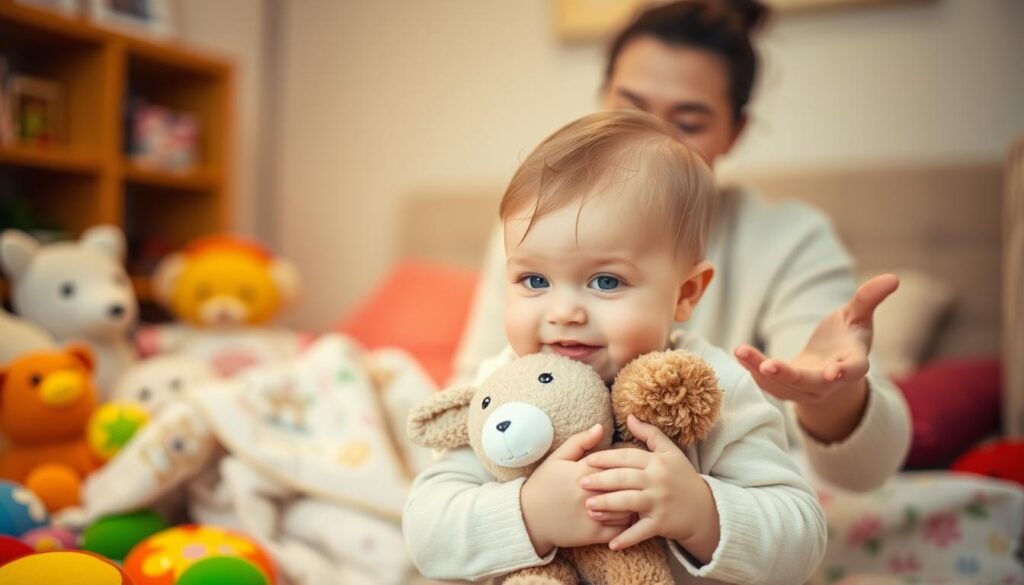
By following these tips and using strategies for toddler separation anxiety, you can make your child feel more secure. Remember, every child is different. It might take some time to find what works best for your child.
How to Handle Toddler Separation Anxiety in Daily Life
Handling toddler separation anxiety can be tough for parents. You want your child to feel safe and less anxious. One good way is to set routines and have a special goodbye ritual. This makes your child feel more in charge and ready for when you leave.
For example, you can share a special kiss or hug every time you part ways. This becomes a comforting tradition for your child.
Another strategy is to help your child become more independent. Encourage them to play alone or with friends. This helps them learn to handle their anxiety better. Also, try gradual separations. Start with short times apart and slowly increase it as they get more comfortable.
Here are some ways to reduce toddler separation anxiety in daily life:
- Establish a consistent daily routine
- Create a goodbye ritual
- Encourage independence through play
- Use gradual separations
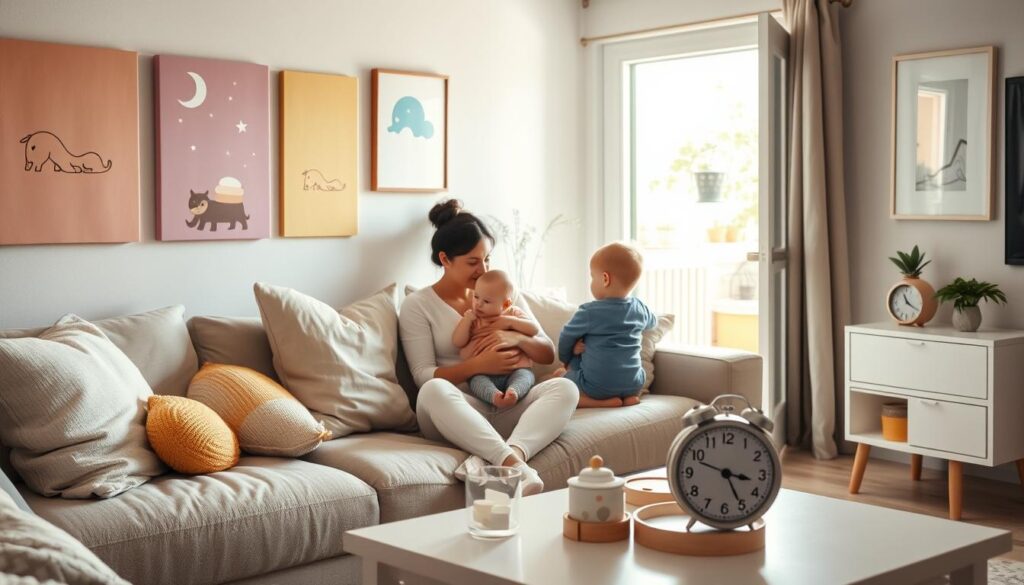
By using these tips and being supportive, you can help your child deal with separation anxiety. It’s okay for kids to feel some anxiety when they’re apart. But with the right approach, they can learn to handle it well and grow strong.
Establishing Goodbye Rituals
Creating a consistent goodbye ritual can really help with toddler separation anxiety. It could be a special hug, a secret handshake, or a reassuring phrase. The goal is to make a routine that your child finds comforting and signals it’s time to go.
Creating Predictable Farewell Routines
A predictable goodbye routine makes your child feel secure and in control. This can include:
- A special goodbye song or phrase
- A consistent departure time and location
- A reassuring ritual, such as a hug or a kiss
By sticking to a routine, you help your child manage their feelings and lessen separation anxiety.
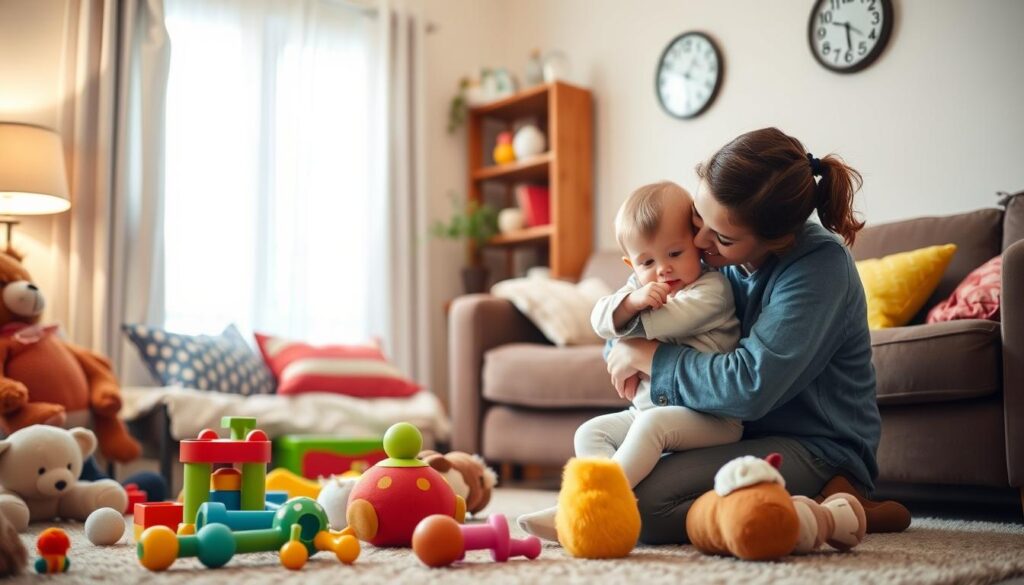
Using Transitional Objects Effectively
Transitional objects, like a favorite toy or blanket, are great for helping your child feel secure. They offer comfort when you’re not there. Try leaving a small item, like a scarf or hat, with your child when you leave. It reminds them of you and helps them feel connected.
By setting up a consistent goodbye ritual and using transitional objects, you can help your child feel more secure. Be patient and consistent. Work together to find a routine that works for both of you. With time and effort, your child will learn to handle their emotions better and feel less anxious when you’re away.
Preparing Your Toddler for Separations
When you’re managing separation anxiety in toddlers, getting them ready for being apart is key. Start by setting a daily routine. This makes your toddler feel safe and builds trust. It’s important to make things predictable and stable when dealing with toddler separation anxiety.
Here are some tips to help you prepare your toddler for separations:
- Establish a goodbye ritual, such as a hug or a kiss, to provide a sense of comfort and reassurance.
- Gradually increase the time you spend away from your toddler, starting with small increments.
- Leave a familiar object, such as a blanket or a toy, with your toddler to provide a sense of security.
By following these tips and being consistent, you can help your toddler feel more secure and reduce separation anxiety in toddlers. Remember, every child is different, and it may take time to find the right approach for your child.
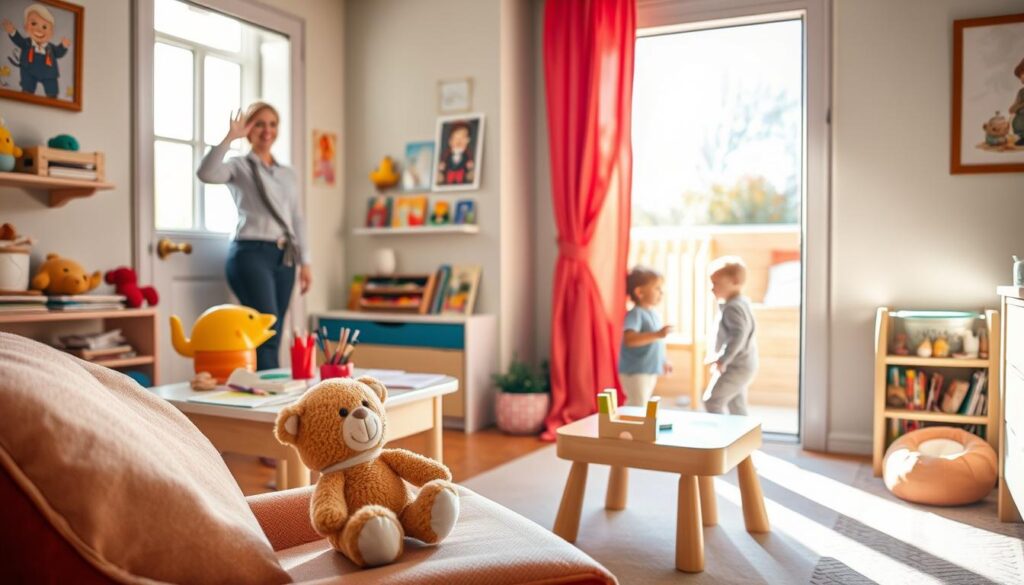
With patience, love, and consistency, you can help your toddler overcome dealing with toddler separation anxiety and develop a sense of independence. By preparing your toddler for separations, you can help them feel more confident and secure. This is important for their emotional and psychological growth.
| Age | Separation Anxiety Symptoms | Preparation Tips |
|---|---|---|
| 12-18 months | Crying, clinging, and tantrums | Establish a consistent daily routine, create a goodbye ritual |
| 18-24 months | Increased clinginess, fear of strangers | Gradually increase time away, leave a familiar object |
| 2-3 years | Improved communication, reduced clinginess | Encourage independence, praise accomplishments |
Managing Separation Anxiety at Daycare or Preschool
Starting daycare or preschool can be tough for both you and your child. To ease your child’s separation anxiety, it’s key to find good ways to cope. Working with teachers and caregivers is a big help in making the transition smoother.
Collaboration is Key
Talking to the daycare or preschool staff about your child’s anxiety is important. This way, they can support your child better. Together, you can make a plan to help your child feel more at ease.
Gradual Introduction
Introducing your child to the new place slowly can help. Start by visiting the place with your child and meeting the staff. Gradually, your child will spend more time there, getting used to it and trusting the caregivers.
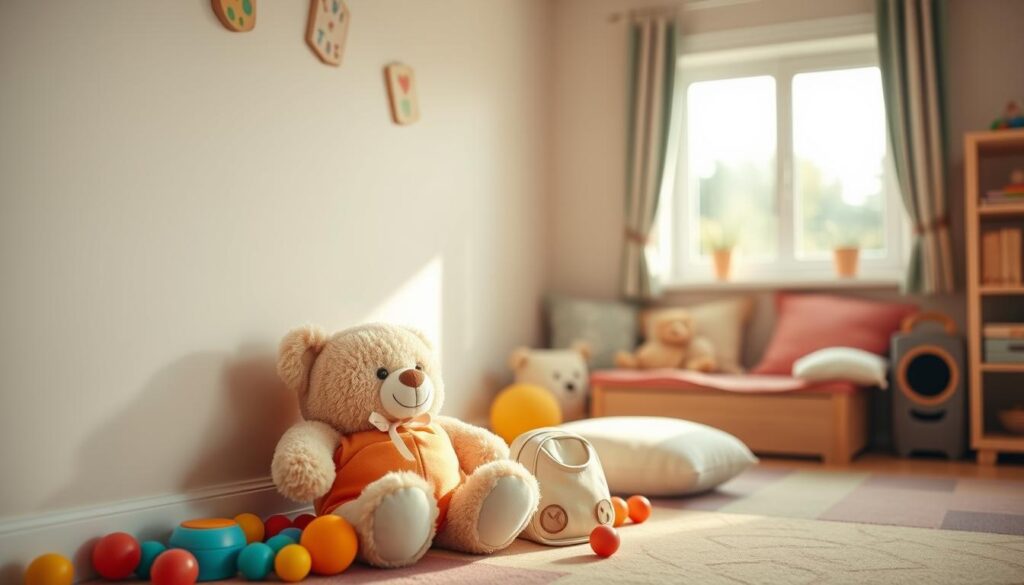
Good ways to deal with separation anxiety include a consistent goodbye ritual and using comfort objects. Keeping in touch with the caregivers is also important. With these steps, your child will feel safer and less anxious.
- Establish a consistent goodbye ritual to provide a sense of predictability and comfort.
- Use transitional objects, such as a favorite toy or blanket, to provide reassurance and comfort.
- Maintain open communication with the caregivers to ensure you’re both on the same page and can work together to support your child.
By following these tips and working with the daycare or preschool staff, your child can overcome separation anxiety. They will do well in their new place.
Building Independence Through Play
As a parent, you want your child to grow independent and reduce toddler separation anxiety. Play is a great way to help them. It builds confidence and self-reliance, key for beating separation anxiety.
Here are some ways to boost independence through play:
- Encourage solo play with toys or puzzles.
- Play together through reading, singing, or games.
- Let your child choose toys or activities.
By using these methods daily, your child will learn to reduce toddler separation anxiety and grow independent. Every child is different, so adjust your approach to fit their needs and personality. With patience and the right toddler separation anxiety solutions, your child can overcome anxiety and do well.
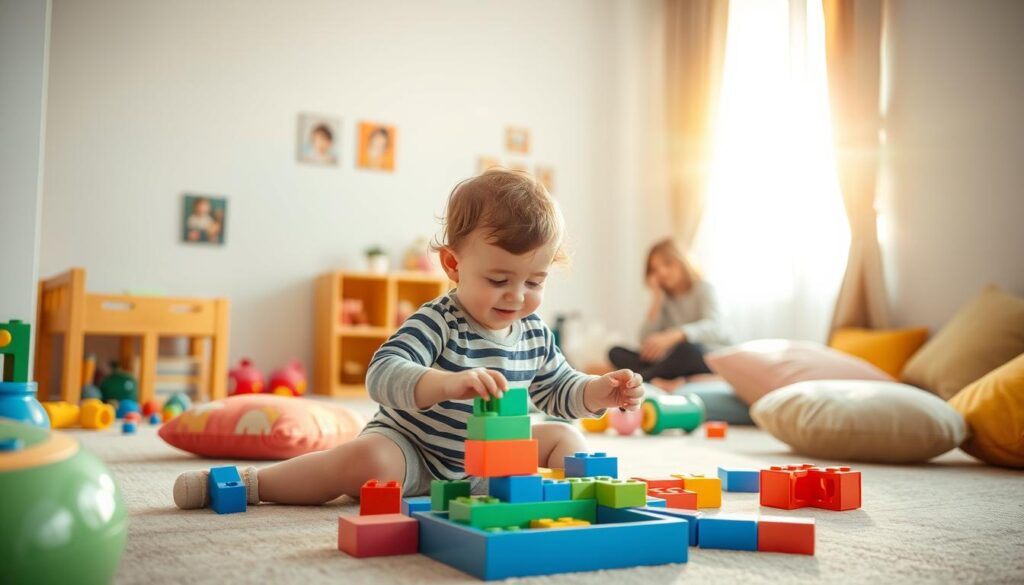
When to Seek Professional Help
As a parent, knowing when your child needs professional help is key. Managing toddler separation anxiety can be tough. But, with the right support, you can help your child get through it. If your child’s anxiety is constant, severe, or affects their daily life, it’s time to seek help.
Some signs to watch for include:
- Extreme distress when separated from you or other caregivers
- Refusal to participate in activities or attend school due to separation anxiety
- Physical symptoms such as headaches or stomachaches when separated from you
There are many ways to get professional support. You can try therapy, counseling, or talk to a pediatrician or child development specialist. Getting help can teach you how to manage your child’s anxiety and support their emotional health.
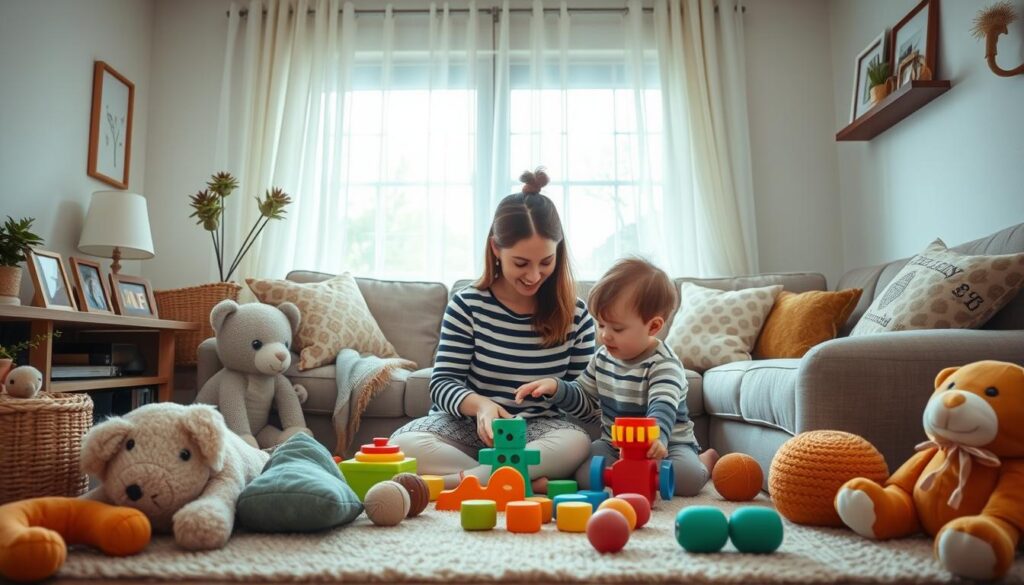
Remember, asking for help is a sign of strength, not weakness. By taking action, you help your child develop healthy ways to deal with anxiety. This builds their confidence and sense of security.
Supporting Your Own Emotional Well-being
Dealing with toddler separation anxiety can feel overwhelming. But remember, you’re not alone. Many parents face this challenge. It’s key to focus on your emotional well-being to help your toddler.
Self-care is a great way to start. This can include exercise, meditation, or hobbies that make you happy. These activities help you feel better and support your toddler.
To be emotionally strong for your toddler, seek support. Talk to family, friends, or join a parenting group. A therapist can also offer valuable guidance. Taking care of yourself helps you support your toddler better.
- Setting realistic expectations and being kind to yourself
- Prioritizing your own needs and taking breaks when necessary
- Seeking support from loved ones or a therapist
- Engaging in activities that bring you joy and help you relax
By focusing on your emotional well-being, you create a stable environment for your toddler. This is key in helping them overcome separation anxiety. Remember, it’s okay to ask for help on this journey.
| Self-Care Activities | Benefits |
|---|---|
| Exercise | Reduces stress and anxiety |
| Meditation | Improves emotional regulation |
| Hobbies | Increases joy and fulfillment |
Common Mistakes to Avoid When Managing Separation Anxiety
Managing separation anxiety in toddlers requires avoiding common mistakes. These mistakes can make the problem worse. One key tip is to have a consistent goodbye ritual.
Counterproductive Responses to Avoid
Don’t make promises you can’t keep. This can make your child more anxious. Instead, create a safe space where they can share their feelings. This helps reduce anxiety and builds security.
Breaking Harmful Patterns
Identify the causes of your child’s anxiety to break harmful patterns. Once you know the cause, you can start fixing it. Begin with small steps, like leaving the room for a short time.
Building Better Habits
Creating a daily routine helps your child feel secure. This can reduce separation anxiety. Remember, every child is different. Be patient and find what works for your child.
Conclusion: Moving Forward with Confidence
Remember, toddler separation anxiety is a normal part of growing up. You and your child can face it together. Use the strategies from this article to help your child feel safe and confident, even when you’re apart.
Stay patient and keep your child’s needs in mind. If you need help, don’t be afraid to ask for it. This will make a big difference.
As you work through this, your bond will only get stronger. Be confident in your ability to support your child. Every child is different, so trust your own judgment and do what’s best for your family.
By focusing on your child’s emotional health and taking care of yourself, you’ll overcome toddler separation anxiety. You got this!
